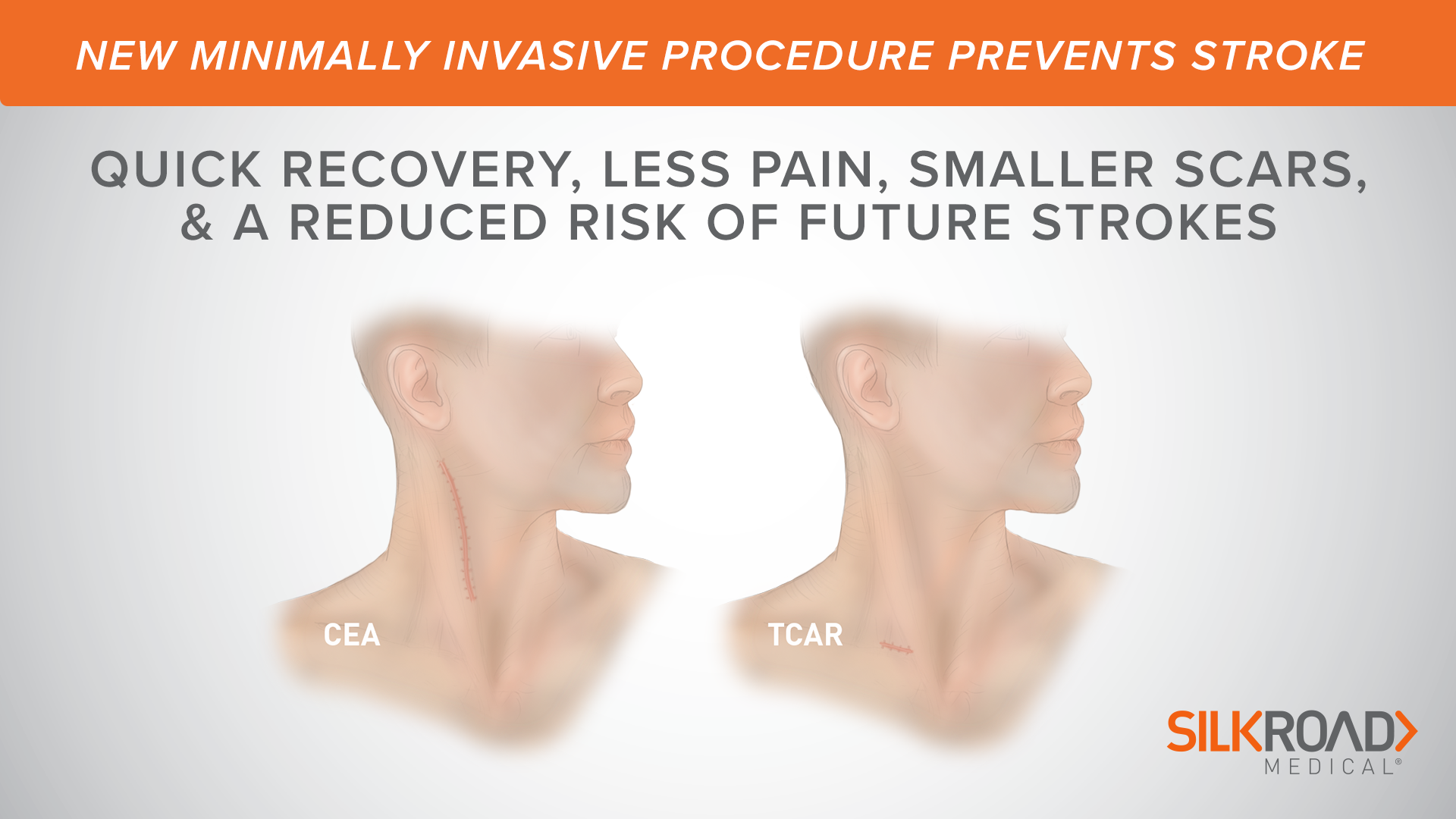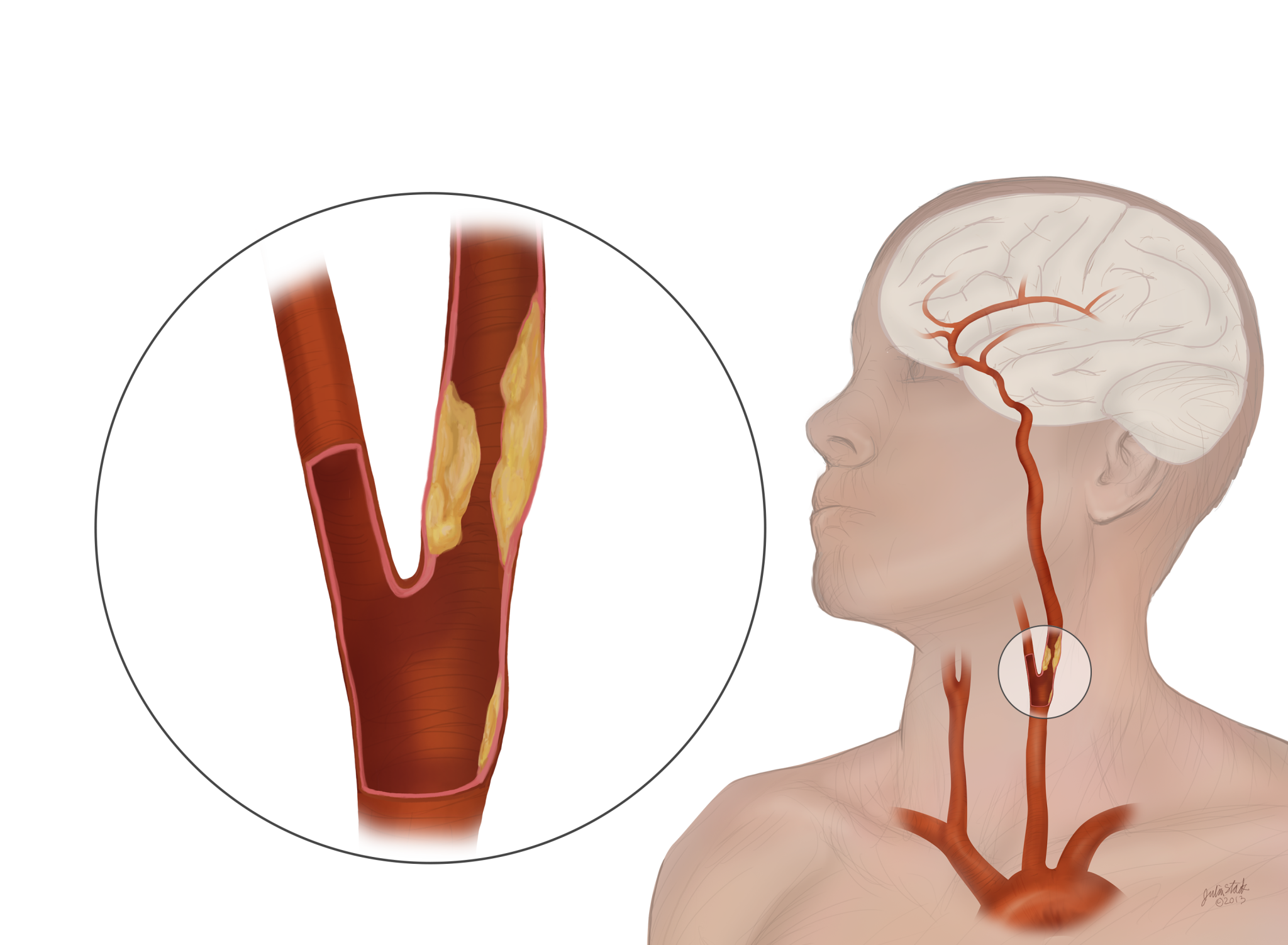Trans Carotid Artery Revascularization
What is TCAR?
TransCarotid Artery Revascularization (TCAR)
TCAR is a hybrid procedure that was developed to treat patients with carotid artery disease who are at risk for open surgery.
→ The entire TCAR procedure is performed through a smaller incision in the neck and in less than half the time of a carotid endarterectomy – limiting the stress on the heart and significantly cutting the risk of the patient having a stroke or heart attack during the procedure.
→ During the TCAR procedure, a tube inserted into the carotid artery is connected to a system that temporarily directs blood flow away from the brain to protect against dangerous debris from reaching the brain and causing a stroke during the procedure. Surgeons filter the blood before returning it to a vein in the groin, and a stent is implanted to the carotid artery to stabilize plaque and help prevent future strokes.
→ Patients who undergo the TCAR procedure recover quickly and almost always go home the next day to return to full and productive lives with less pain and smaller scars than traditional treatments, and a reduced risk of future strokes.
Important TCAR Information
It is important to follow your physician’s instructions for medications before and after this procedure. Drink plenty of water before midnight the day before your procedure. Should you be told otherwise please consult with your physician right away.
What to expect after your procedure
→ Most patients are able to go home the day following the procedure
→ You may experience some pain after this procedure, but it should be minimal
→ Follow all your physician’s instructions for taking care of your incision site
→ If you experience unusual headaches, dizziness, or other unusual symptoms, call the physician who performed your procedure immediately or dial 911
TCAR Testimonial
Patient testimonial after having the TCAR procedure
“Jackie Purswell describes how Silk Road Medical’s TCAR procedure allowed him to continue doing what he loves before suffering from Carotid Artery Disease. The TransCarotid Artery Revascularization (TCAR) procedure is a clinically proven treatment for Individuals with Carotid Artery Disease.” – provided by Silk Road Medical
What is carotid artery disease?
Carotid/transcarotid Artery Disease
Carotid artery disease → This is a form of atherosclerosis, or a build-up of plaque in one or both of the main arteries of the neck. The carotid arteries are vital as they feed oxygen-rich blood to the brain. When plaque builds up in the carotid arteries, they begin to narrow and slow down blood flow, potentially causing a stroke if blood flow stops or plaque fragments travel to the brain.
Stroke → Every year, 15 million people worldwide suffer a stroke, also known as a brain attack. Nearly 6 million die and another 5 million are left permanently disabled. Carotid artery disease is estimated to be the source of stroke in up to a third of cases, with 427,000 new diagnoses of the disease made every year in the United States alone.
Diagnosis →
Carotid artery disease is typically silent and does not present with symptoms. Physicians can screen patients based on risk factors like high blood pressure, diabetes, obesity and smoking. Sometimes, patients are screened for carotid artery disease if the doctor knows the patient has vascular disease elsewhere in the body. Blockages can also be found when a physician hears a sound through a stethoscope placed on the neck. The sound is caused by blood flowing past the blockage.
If someone is having stroke-like symptoms (weakness/numbness on one side, loss of eyesight/speech, garbled speech, dizziness or fainting), they should seek immediate medical attention and be evaluated for carotid artery disease. If you suspect a stroke, remember to act F.A.S.T.
The following tests may be performed if carotid artery disease is suspected:
Carotid artery ultrasound → This test uses sound waves that produce an image of the carotid arteries on a TV screen and can be helpful in identifying narrowing in the carotid arteries. This test is painless and does not require the use of needles, dye or X-rays.
Angiography → An angiogram uses X-rays to take a picture of the carotid artery. In order for the X-ray to “see” the arteries, a dye is injected through a small tube (catheter) inserted into an artery in the groin or arm. This procedure will determine exactly where the narrowing is located and will help to guide further treatments.
If carotid disease is diagnosed during one of these tests, a doctor will discuss treatment options.
Treatment options
Treatment options for carotid artery disease depend upon the severity of the overall patient condition and symptoms. Moderate disease may not require an interventional procedure, as some individuals can manage the disease with medications and lifestyle changes. More severe blockages may require surgery.
Today, there are three primary surgical approaches:
Trans Carotid Artery Revascularization (TCAR)
Carotid Endarterectomy (CEA) → This open surgical procedure removes plaque from inside the carotid artery in order to restore normal blood flow to the brain. The surgeon makes an incision on the neck to access the affected artery, opens the artery and removes the plaque. The surgeon will then close the artery and the incision in the neck using stitches.
Transfemoral Carotid Artery Stenting → In this minimally invasive alternative procedure, the physician works through a tube inserted into the artery in the upper thigh. First, a small umbrella-like filter is placed beyond the diseased area of the carotid artery to help limit fragments of plaque from traveling toward the brain during the procedure. The physician then inserts a slender, metal-mesh tube, called a stent, which expands inside the carotid artery to increase blood flow to the brain and stabilize the plaque.
Find a Vascular Surgeon
If you’re looking for a carotid artery disease doctor near you (in Nashville or Middle TN), schedule a consultation at The Surgical Clinic to meet with one of our board-certified vascular surgeons who provide TCAR procedures.

Dr. Julia Boll
Vascular Surgeon
VIEW PROFILE

Dr. Jeffery B. Dattilo
Vascular Surgeon
VIEW PROFILE

Dr. JimBob Faulk
Vascular/Endovascular Surgeon
VIEW PROFILE

Dr. Bryan T. Fisher
Vascular Surgeon
VIEW PROFILE

Dr. Brian Kendrick
Vascular
COLUMBIA

Dr. Billy J. Kim
Vascular Surgeon
VIEW PROFILE

Dr. Allen Lee
Vascular Surgeon
VIEW PROFILE

Dr. Caroline Nally
Vascular Surgeon
VIEW PROFILE

Dr. Adam Richter
Vascular/Endovascular Surgeon
VIEW PROFILE

Dr. Mark Shelton
Vascular Surgeon
VIEW PROFILE

Dr. Todd H. Wilkens
Vascular Surgery
VIEW PROFILE

Dr. Patrick Yu
Vascular
COLUMBIA


